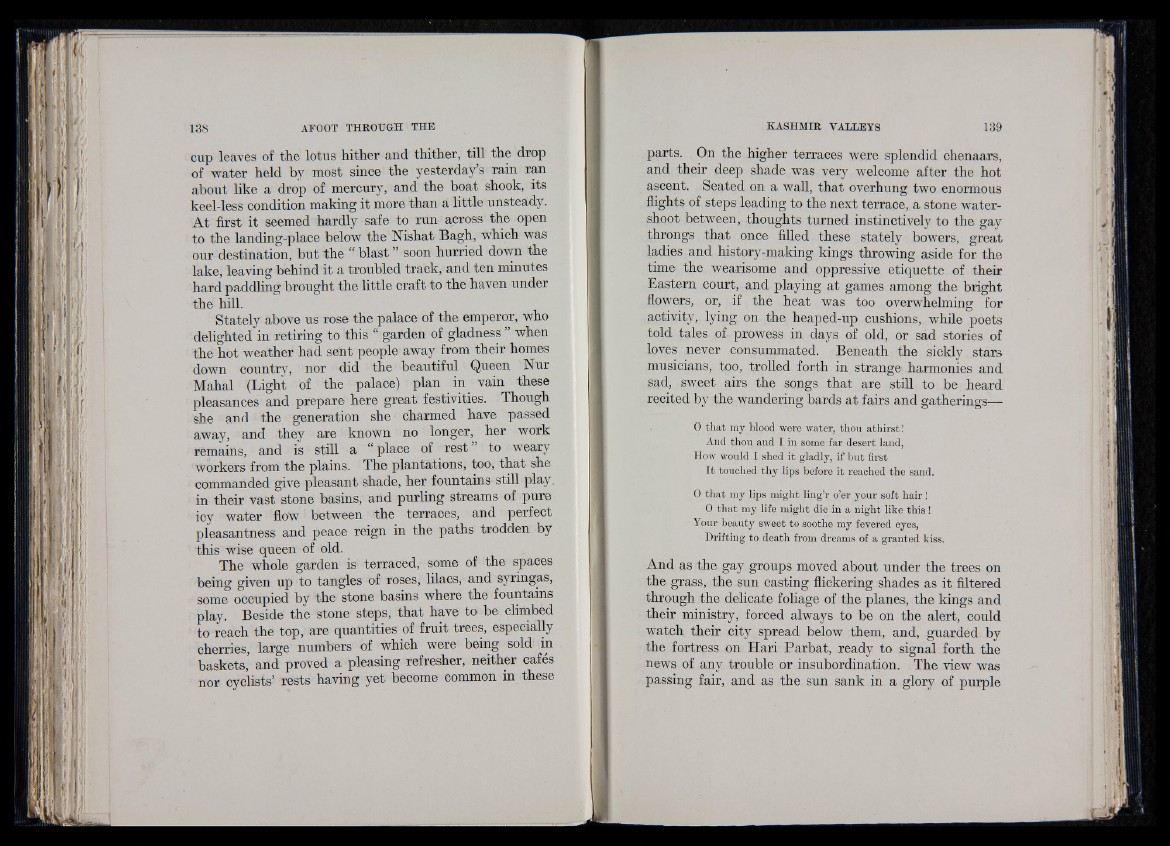
cup leaves of the lotus hither and thither, till the drop
of water held by most since the yesterday s rain ran
about like a drop of mercury, and the boat shook, its
keel-less condition making it more than a little unsteady.
At first it seemed hardly safe to run across the open
to the landing-place below the Nishat Bagh, which was
our destination, but the “ blast ” soon hurried down the
lake, leaving behind it a troubled track, and ten minutes
hard paddling brought the little craft to the haven under
the hill.
Stately above us rose the palace of the emperor, who
delighted in retiring to this “ garden of gladness ” when
the hot weather had sent people away from their homes
down country, nor did the beautiful Queen Nur
Mahal (Light of the palace) plan in vain these
pleasances and prepare here great festivities. Though
she and the generation she charmed have passed
away, and they are known no longer, her work
remains, and is still a “ place of re s t” to weary
workers from the plains. The plantations, too, that she
commanded give pleasant shade, her fountains still play,
in their vast stone basins* and purling streams of pure
icy water flow between the terraces, and perfect
pleasantness and peace reign in the paths trodden by
this wise queen of old.
The whole garden is terraced, some of the spaces
being given up to tangles of roses, lilacs, and syringas,
some occupied by the stone basins where the fountains
play. Beside the stone steps, that have to be climbed
to reach the top, are quantities of fruit trees, especially
cherries, large numbers of which were being sold in
baskets’ and proved a pleasing refresher, neither cafes
nor cyclists’ rests having yet become common m these
parts. On the higher terraces were splendid chenaars,
and their deep shade was very welcome after the hot
ascent. Seated on a wall, that overhung two enormous
flights of steps leading to the next terrace, a stone water-
shoot between, thoughts turned instinctively to the gay
throngs that once filled these stately bowers, great
ladies and history-making kings throwing aside for the
time the wearisome and oppressive etiquette of their
Eastern court, and playing at games among the bright
flowers, or, if the heat was too overwhelming for
activity, lying on the heaped-up cushions, while poets
told tales of prowess in days of old, or sad stories of
loves never consummated. Beneath the sickly stars
musicians, too, trolled forth in strange harmonies and
sad, sweet airs the songs that are still to be heard
recited by the wandering bards at fairs and gatherings—
0 tha t my blood were water, thou a th irs t!
And thou and I in some far desert land,
How would I shed it gladly, if but first
I t touched thy lips before it reached the sand.
0 th a t my lips might ling’r o’er your soft h a ir!
0 th a t my life might die in a night like this !
Your beauty sweet to soothe my fevered eyes,
Drifting to death from dreams of a granted kiss.
And as the gay groups moved about under the trees on
the grass, the sun casting flickering shades as it filtered
through the delicate foliage of the planes, the kings and
their ministry, forced always to be on the alert, could
watch their city, spread below them, and, guarded by
the fortress on Hari Parbat, ready to signal forth the
news of any.Trouble or insubordination. The view was
passing fair, and as the sun sank in a glory of purple